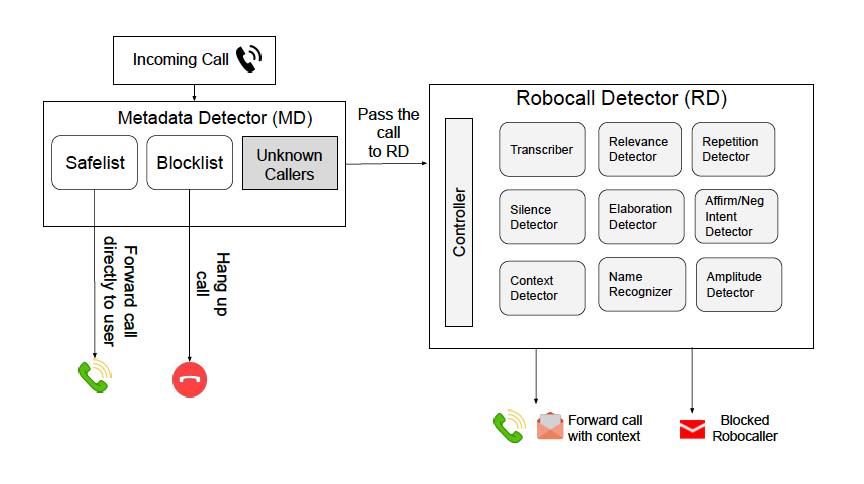RobocallGuardPlus is designed to address the limitations of current methods of blocking the mass robocalls that negatively impact millions of people daily. Georgia Tech’s technology is based on a smart virtual assistant that uses a novel voice interaction model that generates natural conversation, enabling the system to accurately identify humans and robots on the other end of the line. While most current robocall blocking methods rely primarily on caller ID and block lists (and are therefore highly susceptible to evasion by increasingly sophisticated caller ID spoofing), RobocallGuardPlus is the first known system that interacts with the caller and, using questions that occur in human conversation, detects robocalls that utilize caller ID spoofing. Georgia Tech’s user studies have demonstrated this robust system’s ability to block up to 95% of mass robocalls, and security analyses suggest it may be capable of also blocking even more sophisticated robocall methods expected to emerge in the future.
- Advanced: Uses a unique smart virtual assistant with a voice interaction model that generates natural conversation to filter out robocalls
- Robust: Blocks robocalls that other methods may miss, such as those that evade call block lists through caller ID spoofing
- Unique: Provides the first known system to block mass, evasive, and targeted robocalls using natural, interactive conversation methods rather than relying solely on caller ID and block lists
- Smart: Determines if a caller is a bot or a human by analyzing conversation responses and patterns, and passes on calls to the recipient only if a human caller is detected
- Convenient: Requires no human/recipient interruption during the human-or-robot determination process
- Demonstrated: Blocked 95% of mass robocalls, 82% of evasive robocalls, and 75% of targeted robocalls in a user study of 8,000 robocalls
Georgia Tech’s innovation can be used as a standalone robocall blocking system, and can also integrate with other systems, including those that use STIR/SHAKEN protocols.
YouMail™ estimates that 4.4 million robocalls were made in the U.S. in June 2021 alone, and the Federal Trade Commission phone complaint portal receives millions of reports of fraudulent calls and scams each year. The Federal Communications Commission’s mandate for telecom companies to begin using SHAKEN/STIR by June 2021 is expected to enable callees to more readily verify the correctness of caller IDs. However, this measure is not effective against scam calls and robocalls originating outside the U.S. Also, since phone numbers can be cheaply acquired to overcome blocklists, elimination of caller ID spoofing is not a cure-all. As robocall technology evolves quickly to evade available defense measures, innovations that can quickly and accurately detect and block them are needed.
YouMail is a trademark of YouMail Inc.
How It Works
RobocallGuardPlus enables safelisted callers to immediately forward to the recipient, while automatically blocking any callers on the user’s block list. When a call comes in from a number that is neither safelisted nor blocked, the system’s smart virtual assistant answers the call on behalf of the recipient—much like a human assistant would—to weed out robocalls. Using natural language processing (NLP)-based machine learning methods, the system makes involved conversation with the caller through multiple interactions and blocks robocalls based on the call content and the interaction pattern. It generates conversation and questions that would be easy for a human to engage with but difficult for a robocaller to generate an appropriate response to without incurring significant additional expense. The system then forwards a call to the recipient only once it has determined that the caller is a human.
Why It Is Better
While many robocall blocking technologies are available commercially, they typically rely on blacklisted phone numbers detected via caller ID and do not account for caller ID spoofing. Some applications provide additional protections, but still suffer from limitations. For example, some systems forward calls to a server to analyze the call’s audio in an attempt to identify bots. However, the caller continues to hear rings during this process, which may deter legitimate callers. Current technologies are also unable to adequately deter robocalls that use voice activity detection. Apps that offer call screening are also popular, but some versions require significant user interaction and even newer versions are expected to be evaded by future robocall technology. By contrast, Georgia Tech’s technology provides a seamless, smart assistant screening process that does not require user interaction or interruption, is effective against caller ID spoofing, and generates natural conversation to detect robots based on both responses and interaction patterns.

Georgia Tech’s RobocallGuardPlus system architecture
